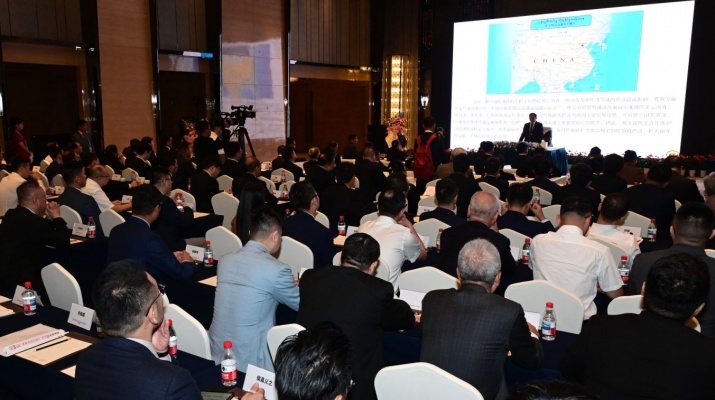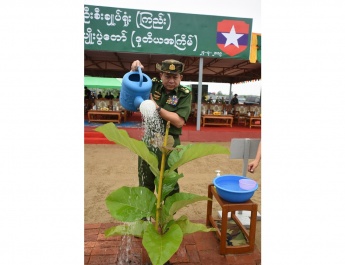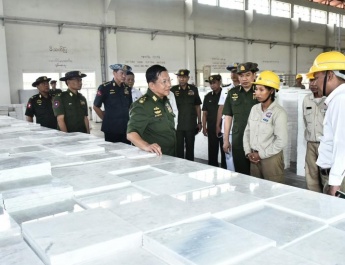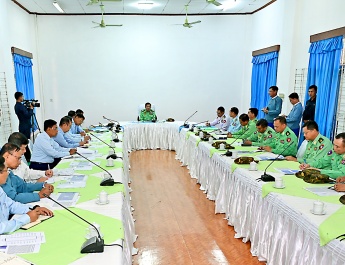NAY PYI TAW August 31
Acting President of the Republic of the Union of Myanmar, Chairman of State Security and Peace Commission of the Republic of the Union of Myanmar, Senior General Min Aung Hlaing delivered an address at the Myanmar-China economic cooperation promotion meeting at Tangla Hotel in Tianjin of the People’s Republic of China at 9 am Chinese standard time today.
Also, present at the meeting were members of the high-level Myanmar delegation, the Ambassador of the People’s Republic of China to Myanmar, the Ambassador of Myanmar to China, the president of the Union of Myanmar Federation of Chambers of Commerce and Industry (UMFCCI) and members, Chinese businesspersons wishing to invest in Myanmar, economists and officials.
Discussions on promotion of Myanmar-China economic cooperation
First, the Senior General said that as Myanmar and China share a border of more than 1,300 miles, economic and social relations, border trade, infrastructure development, improved transport connectivity, and stability and peace in border areas play an important role between the two countries. In 2011, the Myanmar-China Comprehensive Strategic Cooperative Partnership was launched, and since then, prospects for economic and trade cooperation have been promising, with significant growth in bilateral trade and investment volumes.
China is Myanmar’s largest trading partner and ranks second among the 53 countries investing in Myanmar. The value of bilateral trade between the two countries reached over US$-8 billion in the 2023–2024 financial year, over US$-7.7 bill-ion in the 2024–2025 financial year, and more than US$-3 billion up to July of the 2025–2026 financial year, showing that trade relations remain strong. Myanmar mainly exports agricultural products such as rice, various pulses and sesame, as well as fishery products, teak and hardwood raw materials, and basic wood-based finished products to China. Efforts are being made to produce higher value-added wood-based products for distribution and export to both domestic and international markets. In this regard, there is a desire to further expand bilateral trade and investment between the two countries.
As the two countries share a common border, border gates play an important role in trade. Since border trade directly contributes to the socio-economic development of the peoples of both nations, it is necessary to work together as much as possible to ensure stability and peace in the border regions and to allow trade activities to resume smoothly.
At present, instability in the Myanmar-China border region is also affecting Yunnan’s economy. If the border gates between the two countries can be reopened, not only will the flow of goods increase beyond previous levels, but trade routes can also be expanded from northeastern Myanmar into Yunnan Province, Sichuan Province, Chongqing Municipality, and Nanning City of Guangxi Province. This trade corridor would become a key route for both Myanmar and China, while also serving as a land bridge linking China’s southeastern, central, and southern regions with Myanmar and further connecting to ASEAN countries for economic and trade activities. Therefore, priority must be given to cooperation in ensuring peace, stability, and security in the border regions of both countries.
With China’s assistance, projects are being implemented in Myanmar for socio-economic development in the sectors of education and health, electricity and energy, agriculture, industry, and transport and communications for infrastructural development. Joint projects between the two countries include the Kyaukpyu deepsea port project, the Myitsone hydropower project, and the oil and natural gas pipeline project. At present, work is also underway on the Muse–Mandalay new railway construction project and the Mandalay–Kyaukpyu railway project.
The Mandalay–Muse railway is a high-speed rail project that will link Muse, a border town on the China–Myanmar frontier, with Mandalay, Myanmar’s central commercial hub. It will also connect with the Beijing–Kunming–Ruili high-speed rail line currently under construction in China. Muse is the most important border gate city in China–Myanmar trade. In the 2023–2024 financial year, the total value of border trade between the two countries exceeded US$-3.2 billion, of which more than US$-2 billion was through the Muse–Ruili border gate. Moreover, this railway project will provide China’s landlocked southern provinces with an outlet to the sea through Myanmar. The Muse–Mandalay railway is the first phase of the Kyaukpyu–Kunming railway project and represents a key component of it. The Mandalay–Kyaukpyu railway project, in turn, holds the potential to become China’s gateway to the Indian Ocean, offering promising opportunities ahead.
Myanmar shares borders with the most populous China, Bangladesh, and India, making it a country with many opportunities for trade. In addition, Myanmar occupies a strategically important geographical posi-tion at the junction of South Asia, Southeast Asia, and China. It also lies at a crossroads of transport routes and has the potential to provide China with access to the Indian Ocean. Therefore, it should be noted that the transport and infrastructure sectors offer promising prospects for China.
The Senior General stated that if the railway projects can be successfully implemented, there are good prospects for trade to be conducted as far as the Russian Federation, which, although geographically distant, has good relations with both nations. He added that as China is located between Myanmar and Russia, if the three nations cooperate to expand the trade sector, good opportunities can emerge that will greatly support regional goods flow.
Additionally, he stated that Myanmar was one of the first countries to ratify the Regional Comprehensive Economic Partnership (RCEP) agreement, and that China had confirmed it came into effect for Myanmar on May 1, 2022. He added that due to the RCEP agreement, the China-Myanmar bilateral investment agreement, the ASEAN-China Free Trade Area Agreement (ACFTA), and protective and facilitative measures in Myanmar’s invest-ment law, he believes the two nations will be able to strongly increase cooperation both bilaterally and on a regional level.
He stated that Myanmar is participating in China’s Belt and Road Initiative (BRI) and officially joined the project by signing a Memorandum of Understanding on cooperation during the first Belt and Road International Cooperation Forum in 2017. The MoU was signed between the Governments of Myanmar and China within the framework of the Silk Road Economic Belt and the 21st Century Maritime Silk Road Initial Plan. The BRI project has two main pillars: the land-based Silk Road Economic Belt, which economically links China with European countries, and the Maritime Silk Road, which is a maritime connection with Southeast Asian, African, and European nations.
He stated that the BRI project includes six international corridors, and Myanmar is involved in the Bangladesh-China-India-Myanmar (BCIM) Economic Corridor, which uses both land and sea routes, and the China-Indochina Peninsula Economic Corridor.
He added that the Mandalay-Muse railway project is also included in these projects, and they are striving to implement it as quickly as possible. The railway project is not only an important part of bilateral trade but also contributes to the implementation of the BRI. Therefore, as it is a project that greatly benefits both nations, he called for everyone to cooperate for its speedy completion.
China is leading the Global Development Initiative (GDI), which includes eight priority areas. Many of these areas align with Myanmar’s context, making our country one with numerous investment opportunities for businesspeople. We are implementing a direct yuan-kyat payment system for trade, cross-border money transfers, and investments, aiming to facilitate the smooth operation of Chinese partner businesses in Myanmar. We hope to further increase trade and investments through the border trade gates between the two countries. Therefore, we have significantly provided benefits and tax exemptions for our partner businesspeople. We will strive to ensure that those who come to invest and trade in Myanmar do not suffer losses.
A free and fair general election will be held in Myanmar in December, which will further strengthen political stability. As stability increases, economic opportunities will also improve. Combining Myanmar’s above-ground, underground, and water resources, human resources, and China’s investments will yield significant positive results for both countries.
Myanmar is strategically located close to major economic markets like China, India, and ASEAN countries. Therefore, we maintain friendly relations with all countries worldwide, especially neighbouring countries like China.
I am delighted to have the opportunity to share and discuss cooperation potentials between businesspeople, intellectuals, and technicians from China and Myanmar, which will be highly beneficial for both countries. I sincerely invite you to invest with confidence in economic cooperation with Myanmar. I believe that through this meeting, the relations between the two countries will be long-lasting and stable, and we can achieve better cooperation in the future.
Chinese businesspeople interested in investing in Myanmar or those who have already invested discuss their inquiries and needs openly
Following this, the Chinese companies and individuals interested in or already invested in Myanmar openly raised questions and held discussions regarding various matters. These included inquiries about the conditions for making investments in Myanmar, Myanmar’s export-import policies, the desire to further expand invest-ments in the EV car assembly and manu-facturing industry in Myanmar and to understand tax rates, the willingness to invest in solar power generation and energy production using waste materials, the desire to invest in upgrading Myanmar’s mining operations and enhancing the energy production sector, the need to engage in environmental conservation efforts due to resource extraction, the situations in which the Myanmar government can resolve difficulties encountered during investment activities, the conditions under which companies can make investments in Myanmar and the desire to understand Myanmar’s export-import policies, the necessity to further open up economic communication channels between the two countries, the need to carry out investment protection measures, the conditions under which China’s investment projects can bring significant benefits to Myanmar and its citizens, and they expressed special gratitude to the Acting President of the Republic of the Union of Myanmar, Chairman of the State Security and Peace Commission, for taking the time to receive, answer, and discuss the inquiries from Chinese businesspeople.
Respective Union Ministers provide responses and engage in discussions
Regarding the questions and discussions raised by the companies from China, the Union Ministers from the relevant minist-ries accompanying the trip respectively provided explanations and engaged in discussions on the following matters: the current assembly and production of EV cars in Myanmar using the Semi-Knocked Down (SKD) system; the tax exemptions granted for the import licensing of EV cars; the implementation of investment protection measures in Myanmar; and the circum-stances surrounding investments related to energy and electric power, which will be discussed and addressed going forward.
Regarding the discussions, the Acting President of the Republic of the Union of Myanmar, Chairman of the State Security and Peace Commission supplement the discussions
He stated that Myanmar currently permits the import of EV cars suitable for the country and allows their production and sale under the SKD system. Efforts will be made to enhance production capabilities beyond current levels in the future. Considerations will also be given to reducing taxes and fees. Investment, production, and collaboration with Myanmar business-people for re-export to foreign countries can be carried out in the Thilawa Special Economic Zone in Yangon. He expressed his commitment to ensuring the best out-comes for Chinese investments. Reducing the number of fuel-powered vehicles and increasing the use of electric cars in Myanmar is his objective. Therefore, he encouraged Chinese EV manufacturers to come and invest in Myanmar.
Regarding the work on upgrading mineral extraction processes, while the export of raw natural resource materials extrac-ted from our country is not permitted, the export of processed finished products is allowed. Since resource extraction impacts the natural environment, it is essential to carry out environmental conservation activities. Those interested in conducting mineral processing operations in Myanmar are invited to come to Myanmar for discussions.
Then, you are invited to hold discussions on the energy sector and natural gas production. We have given the first priority to the renewable energy sector and are interested in the production of energy from waste as the second priority. It is necessary to take production costs into consideration. Myanmar mainly export rice, pulses and beans and corn to other countries. It is necessary to implement tasks for rapid development of enterprises by forming cooperation teams of Myanmar and Chinese entrepreneurs to ensure development of investment between the two countries.
Afterward, the Senior General made concluding remarks, saying it can be seen that emphasis was placed on development of investment at today’s meeting. The two countries are good neighbourly and sibling countries that share common borders. Through the friendship between the two countries, mutual cooperation for development of the two countries can be carried out. It is necessary to facilitate trade for the development of the country. Our country mainly produces agricultural products, some of which are exported to China. Our country boasts fine rice species like Pawhsanhmwe.
Today’s discussions were successful ones. Discussions with the President of the People’s Republic of China were also successful. We can export goods needed by China from Myanmar. Economic cooperation between the two countries has lasted for many years and market economy has been implemented in the country currently and you can come and discuss investment ventures if you are interested in them. It is necessary to implement them quickly and mutual benefits must be realized. Therefore, I urged all to form Myanmar-China entrepreneurs teams and made cooperation. China has been an emerging country and progressive changes are found whenever I visit the country. We are determined to accelerate development tasks for Myanmar. As doing so requires cooperation of friendly countries, our country needs the efforts of friendly countries to boost economic cooperation as much as possible. You are invited to Myanmar to establish investment ventures in Myanmar and prayed for further successful friendly economic cooperation between Myanmar and China.
After the meeting, the Senior General and party enjoyed the luncheon hosted by the UMFCCI together with China-Myan-mar investment venture entrepreneurs. After the luncheon, process for preparing Myanmar tea leaf salad was demonstrated by officials.
Then, the Senior General cordially greeted Chinese entrepreneurs and economists.
Afterward, a ceremony to sign MOUs between Myanmar and China and new sharing and cooperation MOUs between the Ministry of Information and Xinhua News Agency, cooperation MOU between the UMFCCI and the CASME, Myanmar-India-China Cooperation Association (MICA) and the CASME, a cooperation MOU between ShweThanlwin Holdings Company Limited and China Harbor Engineer-ing Co.,Ltd.(CHEC), a cooperation MOU between Royal Green Ocean Co., Ltd. and Jiangxi Longzheng Technology Development Co., Ltd., a cooperation MOU bet-ween Yunnan Baoshan Hengyi Industrial Group Co., Ltd. (HYIG) and Transland Public Co., Ltd. (TPC) and a cooperation MOU between Platypus Public Co., Ltd and China Enerever Solutions (Shanghai) Co., Ltd. witnessed by union ministers and responsible officials.





